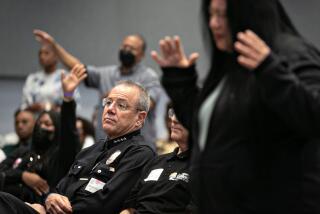Use-of-Force Experts Defend Inglewood Police Officer
- Share via
Two use-of-force experts testified Thursday that former Inglewood Police Officer Jeremy Morse acted appropriately when he threw Donovan Jackson onto a police car last summer, but said his actions would have been unreasonable if the teenager had been unconscious.
The experts -- one current trainer for the Inglewood police and the other a former trainer in the department -- were called to bolster defense assertions that Morse was justified in his handling of Jackson during the videotaped confrontation at an Inglewood gas station. Prosecutors accuse Morse of using excessive force when he hoisted the handcuffed youth and slammed him onto the police cruiser.
In testimony Thursday, both witnesses said Morse’s actions were consistent with guidelines for handling suspects who do not follow commands.
Inglewood Officer George Sanford said Jackson was actively resisting Morse by going limp and becoming dead weight when being lifted. He and David Ishibashi, who is now an investigator with the district attorney’s office, said they assumed Jackson was conscious at the time.
Under cross-examination, both admitted that their assumptions were based largely on the videotape and police accounts. Ishibashi, after watching the videotape, conceded that he saw no signs that Jackson was conscious. And Sanford admitted that he would have drawn a different conclusion if he thought Jackson was not awake while being moved.
“If Donovan Jackson was unconscious when he was put on the hood like that, it would not be reasonable,” Sanford said.
The question of Jackson’s state of consciousness has emerged as a key issue in the trial. Jackson has consistently said he was unconscious. Prosecutors say the videotape clearly shows that Jackson was not moving and appeared lifeless.
But Thursday, Dr. Thomas Edholm, an emergency room physician who treated Jackson after the incident, said he saw no symptoms that Jackson had lost consciousness. And a paramedic and emergency medical technician who evaluated Jackson at the scene testified that the youth told them he had not passed out.
In another line of questioning, Edholm testified that Jackson suffered no serious injuries, only scrapes and bruises, during the confrontation. That testimony was elicited to support the defense’s contention that Jackson would have suffered injuries had Morse used excessive force.
Morse’s attorney, John Barnett, also tried Thursday to leave jurors with a different interpretation of the videotape. He called Ishibashi to testify that the images of Jackson being thrown on the car could be deceptive because the trunk is made of a flexible metal. The “give” on the trunk exaggerates the force of the impact, Ishibashi said.
But under cross-examination, Ishibashi said that the trunk is supported by steel and that an impact with the trunk could cause injuries.
Defense attorneys are scheduled to call their final witnesses today. Barnett said Morse may testify in his own defense.
Morse’s former partner, Bijan Darvish, also is charged in the case. Prosecutors accuse him of filing a false police report. He has denied the charge.
More to Read
Sign up for Essential California
The most important California stories and recommendations in your inbox every morning.
You may occasionally receive promotional content from the Los Angeles Times.










